#what type of mass production is that
Text
will probably be working on Saeturn for a little bit…need a break from Blacklotus for now :/
#Notes for myself#I need to work on their 3 year career with 130 something songs#what type of mass production is that#Like excuse me I didn’t even notice how many song s they really had until I counted their discography#No but really#like a comeback every second month
2 notes
·
View notes
Text
i know as a garrus fan i can't really talk and i don't want to cause a whole Dilemma but the artwork for the mass effect board game is pissing me right off because it's so clear 90% of the effort went into liara and then everyone else is just tweaked screenshots and they claim there's no use of ai but shepard's face doesn't look right either or it's cut/pasted off something
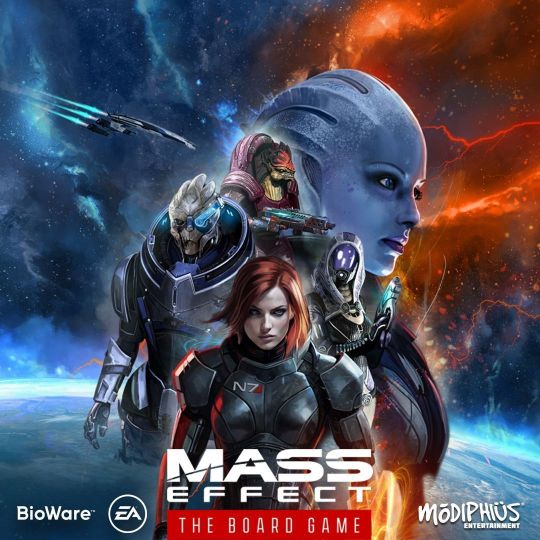
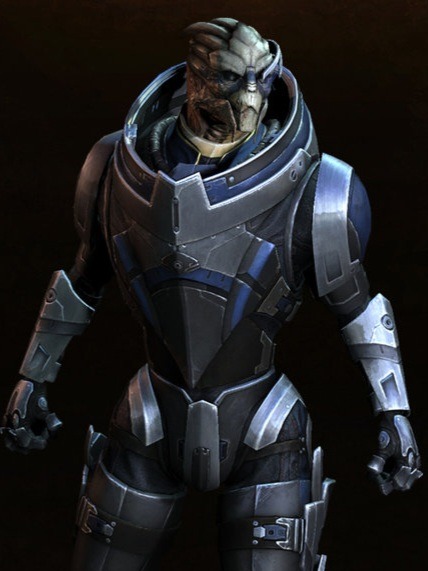

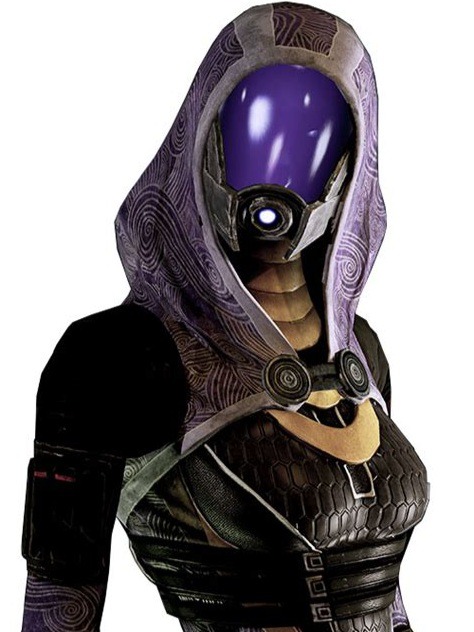
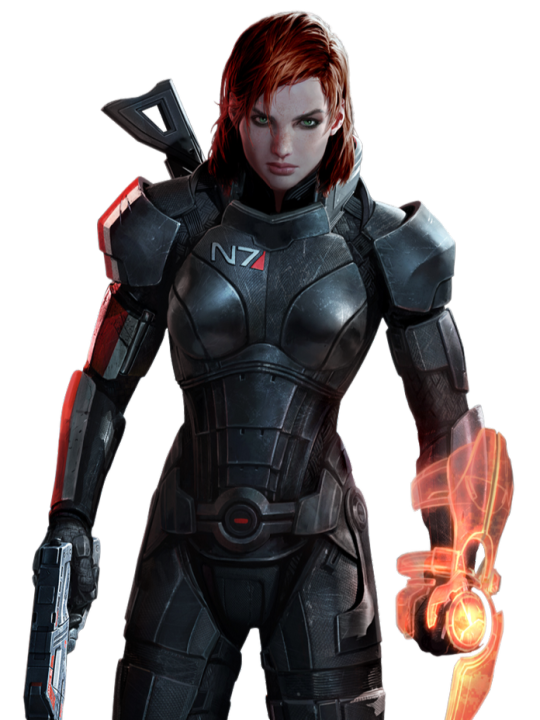
#granted if it's called 'hagalaz' then surely it's about dealing with the shadow broker and thus liara is the actual centre of attention#but at that point why not just use screenshots. like either they hired a professional artist to make this and that's their outcome#and therefore like no creativity or research. or they cheaped out and got someone cheap who didn't have betterment resources#or something in between. or they got crunched. but just??? i know this is petty but it's just irritated me as an artist lol#especially considering this is endorsed/an official product and such like what happened#mass effect#edit: don't know why i typed 'betterment' but 🤷
47 notes
·
View notes
Text
Fucking hell I am going to have A WEEK
#my bff' bd is 29th and i wanna make them a cake myself which means i gotta find all the ingredients on our fucked up little mass market#and then not fuck up the recipe which alright i baked that thing before. ONCE. AND IT ALMOST WAS A DISASTER.#luckily my bff's sister is helping me with that and she's buying the easy to find products so that's nice and appreciated#and i won't have to grate like. seven large carrots all by myself. that would be unfortunate#<- girl who did EXACTLY that last year#i also need to get a boclx for the cake and i wanna decorate it so it isn't just. A Box#and then in the evening me and her sister will go to our mutual friend who's organising all this shit and all three of us are gonna#creepily show up at my bff's window at midnight before her birthday with this cake. we're taking a taxi THANK GOD i hated transporting#a cake through public transport to the other end of the city last time#and then we spend the night at my bff's apartment before going back to oir mutual friend's place spending all day there and potentially ALSO#staying the night and THEN! do you know what happens then? then i go take a PE exam at my uni :)#also before all that i gotta finish some things i have a deadline for at the end of the month. which im supposed to be doing now but#guess what#im typing this instead#because im a whiny bitch okay my social battery is going to be DEAD after this. and i mean completely fucking fried#good luck to me ig#it's all worth it cuz i love my bff#but god am i glad they don't have Tumblr because they aint supposed to know our asses are planning something >:)#cruci shitpost
4 notes
·
View notes
Text
I miss when Hulu used to have a comments section under every video, there was always something interesting (in a human behavior curiosity kind of way) about scrolling down to see usually an absolutely ridiculous collection of people having a rowdy open forum discussion about something you just watched that you had a completely neutral non-reaction to
#unfortunately - everything still trends toward homogenization#people especially tech comanies can't just have their own fucign unique thing. they have to look and act like every other service#to ''''compete''' apparently (even though like... wouldn't having unique features be instead a NOVEL draw to your specific product? wouldn't#you want to stand out???)#Like OKCupid completely over-simplfying their site into bare bones sleek nothingness and taking away all the features that made it unique#in any way (high customization - various personality ranking scales and a LOT of various visible data/information) .. because oh yeah#actually we have to be tinder and just quick emoji blurb swipe swipe#Hulu trying to be netflix and taking away anything that made it stand out in any posiive way (comments section.. other things that I forget#since I've been using it since like 2009 or something)#Youtube.... everything youtube does.... god.......#All social media sites are exactly the same now with extremely minor differences and even then still frequently implement samey#features to try and close those differences#etc. etc.#ANYWAY . i think also the hulu comments sections were facebook linked - like..one of the ways you could actually verify yourself to#leave a comment was having a facebook login (AT LEAST in like 2010.. I don't remember if they changed this at some point)#so you could also usually (I think..?? again.. if I'm rmembering correclty) you could get to someone's facebook profile#from the comments section sometime. I used to watch stuff and then scroll down to see what The Masses were saying and sometimes#someone's comment would be so strange I'd like.. go investigate them as a person#see what type of posts they make on their personal facebook which was always way too public with none of their information#privated of course lol
15 notes
·
View notes
Note
If the Actirangers are the Five Man Band trope, what roles would they all fill? Obviously Blue is the Big Guy, and I feel like Grey is the Lancer. (Haha) But who would everyone else be?
(If you don’t know what I’m talking about, much apologies and I highly recommend Overly Sarcastic Productions’ video on the five man band)
"You merely adopted the TVTropes; I was born in it, molded by it...!"
*cough*
Sorry yes, I am familiar! The Actirangers obviously follow the Super Sentai / Power Rangers archetypes but if we were to slot them into classic tropes:



Red: Leader
Red is probably the simplest member of the gang and the one who most reflects his archetypical role as the Paragon, generically good heroic guy. A Captain America-esque baseball captain figure in the team. I should probably flesh him out more tbh.
Green: Lancer (loyal) / Smart Guy
Green is Red's second in command, and she's more sardonic in contrast to Red's earnest character. Green is heavily inspired by Garrus from Mass Effect and Zoe from Firefly. A steady, focused and competent lieutenant.
Blue: Big Guy / The Heart
Blue is leaning more into the gentle-giant style big guy, befitting a Hockey Goalie. Probably no small amount of Grin from The Mighty Ducks cartoon and Broadway from Gargoyles. I think he's the kind of person who's often underestimated. His kindness makes people assume he's foolish, and his gentleness makes people assume he's soft. And he can be a soft fool, it's only when he wants to be.

Pink: Lancer (foil) / Token Evil Teammate
Pink is probably the character I center most of my own mental energy around. "Token Evil Teammate" is probably a little excessive, but she's probably the Ranger who's most willing to fight hard and is the meanest of the group in general. She's rich, angry, and working on it. She's the sort of person who struggles with loneliness even when surrounded by people who care about her due to her own self-isolating mental baggage. Her story (insofar as the Actirangers have a story) is about working through that.
Yellow: Plucky Comic Relief / The Heart
Yellow is just having a good time. She's the sort of friend who doesn't really occupy a specific role in the group but is happy to support anything that needs doing. She isn't the type to worry overmuch about the future and firmly believes everything will work out.
Gray is obviously the Sixth Ranger, and as of yet isn't really part of the core band. He's the resident angsty boy of the cast. Shadow the Hedgehog, Prince Zuko, etc. A little overdramatic and a little bit of an edgelord but please forgive him, he's still figuring himself out.

Pawnathan might also count as a Cowardly Sidekick? I dunno he's doing his best.

887 notes
·
View notes
Text
The thought of struggling with mobility is so hot to me 😅 getting so big the only way I could get around is with some type of aid
It would start off with small milestones, a few of which I’ve already started to hit. Getting breathless when I’m forced to walk will become more and more frequent; the distance of walking before the wheezing starts would start to shrink.
I’m already adverse to moving and do it as little as possible. The next milestone would be taking a moment to get to my feet. I definitely notice a difference from when I was thin to my current weight. Packing 50lbs on a short frame leaves an impact. My belly is starting to shift my center of gravity. The more it starts to hang down the more I’ll have to adjust.
Overall I’m a bit less coordinated. I’m sure that’s a product of the amount of weed I smoke and my complete and total lack of activity. I find myself tripping and bumping into things more easily. I’ll become even less physically capable with every pound gained.
In addition to struggling to my feet I’ll also start to have issues with picking stuff up. Getting socks and shoes on my feet will only get harder the more my belly mounds up and the heavier my legs get. Everything will be more difficult.
In my wet dreams I imagine myself huge and soft, with my ass planter on a mobility scooter. The only way I’d agree to go out is if I can stay scooter bound and there’s food. The scooter would start to creak the longer it was used, threatening to break down as more mass is added to the load.
At home I see myself having to hold onto the wall and shuffle forward inch by painful inch to get around. I’m only spurred on with the knowledge I can sit down again and the promise of more to eat.
Getting so big you become helpless. Forced to struggle under your self created mass. Body pushed beyond what it was meant to do. All of this would scare the average person, but to me it’s body goals 🤤
#honeybelly#wg thoughts#wg text post#wg text#extreme wg#extreme wg text#gaining weight on purpose#active gaining#enable me fatter#enabling gainer
425 notes
·
View notes
Text
Things that happen within the first few hours of AC6:
1. You get shot with a huge-ass laser mid-atmosphere entry. You barely survive this, landing several miles away from your intended landing zone. Welcome to Rubicon 3.
2. You have a mech built with bargain bin parts, barely held together with hope and spite. It has a energy sword though, so that’s nice.
3. Not even two seconds after your, very rough, landing, you get a call from your “Handler”. He is ostensibly in charge of your well-being. This begins and ends with him sending you off on missions he’s fairly certain you’ll survive and charges you for the damage you get to your mech, the bullets you use, and he’s also cut out a piece of your brain to put in augmentations that will make you a slightly better mech pilot. In the top Most Horrible People On This Planet contest, he wouldn’t make it to the top 10.
4. You make your way through a derelict hunk of junk that’s threatening to collapse on top of you. Not even two minutes into this journey, you’re getting shot at with missiles.
5. You finally reach your intended destination, a burning husk of a city filled with scavengers and low lives who will shoot you on sight. You are here to grave rob.
6. The reason you are grave robbing is connected to the fact you got shot in orbit, you are here illegally, and you need to find a license from any fresh corpse so you can steal the identity on it and be able to do mercenary work.
7. You go through four corpses before you find one with a license that can pass muster.
8. Mid corpse robbing a gunship sent by The Space Police spots you and you have to shot it down so it can’t kill you or, even worse, stop you from stealing the identity you just found.
9. As soon as you get registered in the Mercenary Rolodex, which takes less then a second of an A.I taking a look and saying “alright checks out”, you have two missions. One of them has you killing a bunch of resistance fighters from the planet’s native population on behalf of a weapons company that really wants to do business here.
10. The next mission has you going to a base owned by that very same company and blowing up everything you can find there. This does not anger that company one bit, if anything it just convinces them you are a very thorough worker.
11. Very shortly after that, you are tasked with destroying a prototype mech by another company before it can get into mass production. That mech is being piloted by what can only be described as an Anime Protag who is in the worst possible franchise for his type of character. You can murder him in less then two minutes if you know what you’re doing. You can hear him desperately fight for his life the entire time.
12. After that, before you even get to clean the blood and oil and broken dreams off your robot, you get a call from a merc group leader saying that he’s seen you murder that guy real good, a guy who was auditioning to join his group, and likes the cut of your jib. He gives you the callsign he was gonna give Anime Protag before you blew him the fuck up. He laughs and tells you to be careful since it’s an unlucky number. This is the least morally repugnant thing you’ll do all game.
13. A while after that, you go into a power plant and destroy the generator, it promptly blasts you in the face with the red radioactive Super Fuel that toasted this planet a few years back.
14. You survive, somehow, and you get a disembodied voice of some girl in your ear. You tell your handler about this and he just shrugs it off with “oh yeah that’s probably a symptom of the lobotomy, don’t worry about it”. The voice is probably the most moral person on this fire blasted hell scape of a planet.
#Armored Core#Armored Core 6#this game is nuts#fromsoft knows how to make you feel like the world is horrible#armored core does not in any way fuck about
2K notes
·
View notes
Text



Drawing Ryōmen Sukuna
Development notes
This post has been in the making since last year, before the manga has reached its current arc. My aim was to respond to comments that pointed out that my version of that time didn't look like the one in the anime.
I calculate everything I do and the way I do it. My current goal is to share my thoughts on the development of my take on him - simply because I'm a nerd when it comes to anatomy and I love figuring things out. It involves a lot of thinking, questioning, analysis, dissecting information and building theories. So I totally understand if it's not anyone's cup of tea.
MANGA SPOILER WARNING
The very beginning
I used to have a serious case of lack of self-confidence. My earliest art of Sukuna dates back to 2021, but it always felt like my skills are not worthy of this particular character. I never shared my art. I was also struggling to find my artistic voice. I was obsessed with the idea of semi-realism, but even if I managed to pull it off after weeks of stylisation practices, I didn't like the results.
Due to personal reasons, I stopped trying to draw him for a long time.
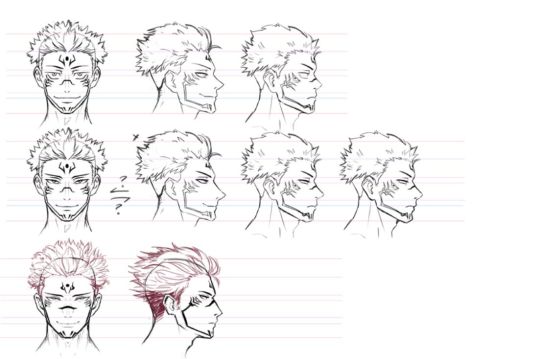
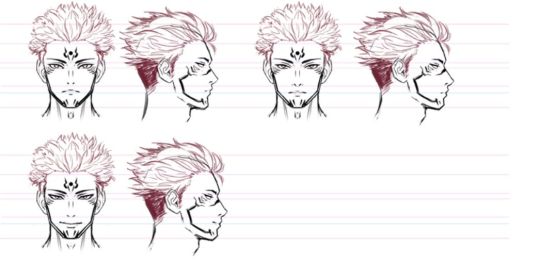
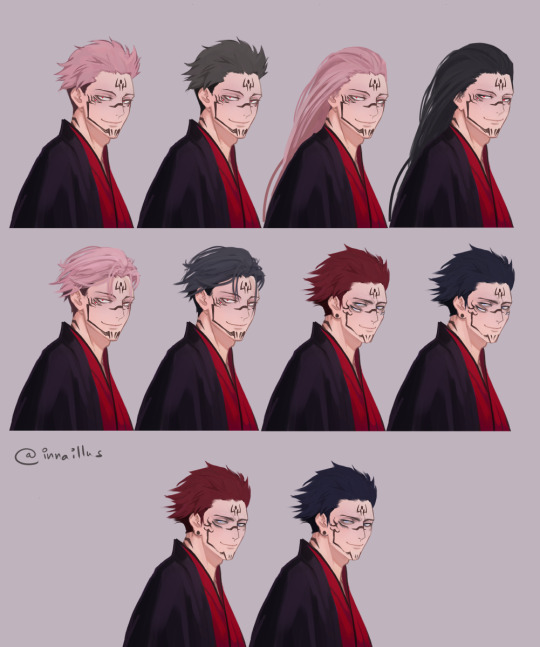
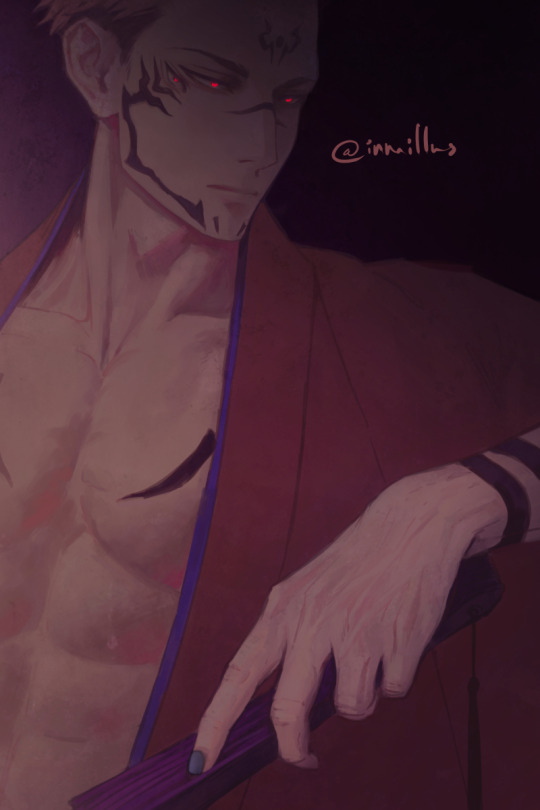
The development of "my" version
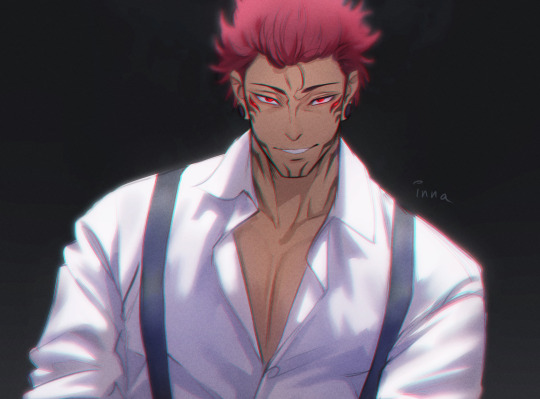
It was an entirely conscious decision to draw him differently.
The top reasons for the change was that I didn't want to sexualise him in his host, Yuuji, who is a minor. Back then I thought he inflicted the deformation on himself (extra limbs, eyes, etc), for the sake of efficiency, and I was curious what he looked like before that - or what he would look like in a civilised environment.
During the process, I considered a number of factors:
the beauty standard of the other JJK men - I wanted him to fit the lineup - his original appearance made him stand out quite much
in a setting where he adheres to the rules of society, more or less, I believe his MBTI personality type (ENTJ) would dictate a lot of his choices when it comes to appearance, at least to a certain extent. I thought he would choose to have an appearance that fits the beauty standards of the era
I kept his tattoos because it's a very distinguishing feature of him, but I also exercise freedom in the way I draw them, to make them as stylish as possible
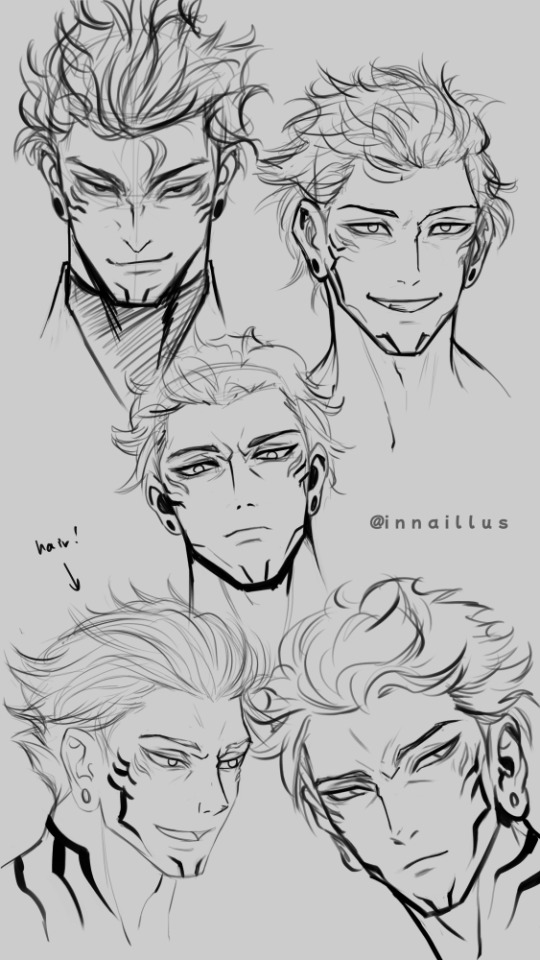
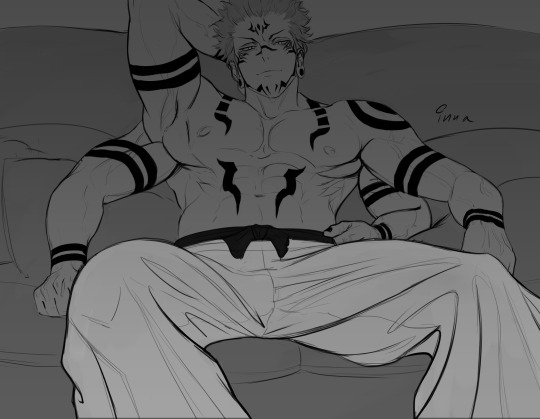
Reincarnation
I used to believe once he reincarnates, his proportions would be closer to that of a "normal" human, even if he has some extra limbs. However, his size and features are above and beyond of what we are used to, and even the story emphasises their malformed appearance. So a a whole new era of Sukuna started in my art. I chose my favourite manga panels of him and mix-and-matched the most attractive features into a figure that I consider on the fine edge of monstrosity and unconventional handsomeness.
Even when I draw him with a regular number of limbs, I keep his usual mass and proportions. I dubbed this form "true gains" form.
I also realised that some of the tattoos Yuuji's body displayed was a product of the partial reincarnation stage, like we see it on Tsumiki's forehead.
NOTE: Did anyone notice that Sukuna is getting progressively more and more human/handsome in the manga? When he took over Megumi's body, I also noticed that as the story progressed, he started to look older and more mature. I'm curious of it was a conscious decision.
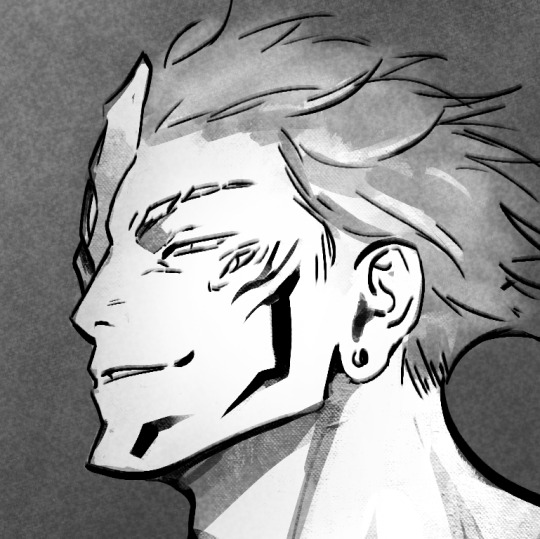
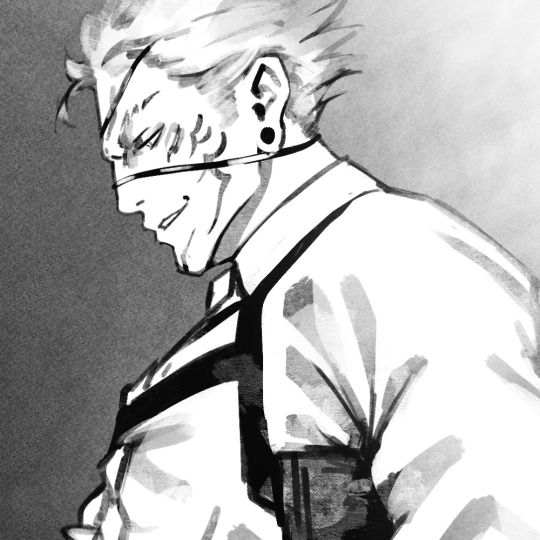
Twin dilemma and speculations
According to the Japanese wikipedia page, the mythical figure Sukuna could have been a conjoined twin. Despite my extensive digging in the matter, I was shocked by the recent lore drop.
My question: what does Sukuna look like in a universe where he did not absorb his twin in the womb during development?
It hasn't been confirmed, but I find it very possible now that he was born with his extra limbs, eyes and mouth, as well as the deformed, wide features. (...as opposed to my first theory about him altering his own body for the sake of efficiency)
This, however, would mean that in a universe where both him and his brother are born healthily, he would look different. There is the obvious lack of extra arms, eyes and mouth - but I believe he would also be closer to the JJK beauty standard of men, as far as proportions go (eg. more narrow face, anime-esque nose, larger eyes).
At first I was hesitant to accept this idea, as I'm very attached to the 4-arm hulk / "true gains" form now, but then I realised: this would mean that "my"version of him actually has logically explainable place in at least an alternate universe.
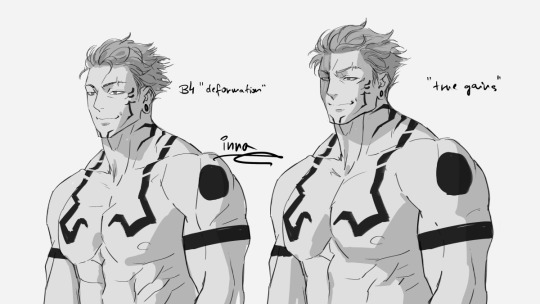
Thank you if you got this far.
I may edit this post later. Let's see where the story takes us.

428 notes
·
View notes
Note
oh i would actually be curious to hear your thoughts on lolita book covers in that case. i do get the sense that some of the covers are designed to uncritically titilate and seem to misunderstand the text, but that could obviously be an assumption on my part lol.
oh i agree that the cover designs tend to run counter to nabokov's intentions, both in the text and in the literal instructions he gave about covers lol. they pretty clearly rely on putting some young girl on display, which is exactly what nabokov did not want to do visually; they also tend to suggest dolores as some kind of seductress (sultry gazes, pouty lips, &c). clearly this is precisely the opposite of what the text tells us about her.
however when evaluating these visual choices i find that many people portray them as some kind of originary and culturally polluting act: that is, a narrative emerges that the problem here is people misinterpreting 'lolita', and then publishing it with covers that will do harm to young girls &c. i think this is lazy analysis and fundamentally makes idealist assumptions overestimating the effect of cultural products (books, book covers) on problems, like the sexualisation of children, that are in fact grounded in material relations, such as in this case the status of children as legal property and the total power granted to adults over them. that is to say, these broader conditions are at root the reason that cultural products like the cover of 'lolita' look the way they do, and chalking it up to individuals not understanding the book is never going to get us very far; and also, although some of these covers are pretty egregious, they are the reflection rather than the cause of the sexualisation of children, a problem that would continue to exist even if every edition of 'lolita' ever printed just said "humbert humbert is an unreliable narrator and dolores haze is a child he is preying on" on the cover.
fundamentally i also think this sort of conversation often elides some more interesting points about whom these covers communicate to and what they say. you suggest they are meant to "titillate"; although i would agree dolores is often shown as sexual, desirable, and seductive, i'm not sure that's the same as assuming the cover is trying to arouse the potential reader. for one thing, to put it bluntly, this style of cover tends to be associated more with books marketed to women than to heterosexual men. and more broadly, and this is something the lolita podcast really fails to understand imo, the phenomenon of people reading 'lolita' and relating themselves to dolores is not mutually exclusive with this type of rhetorical construction of dolores-through-humbert's-eyes. that is, often what appeals about dolores is, i think, precisely the fact that through her, people find a way of discoursing about or simply re-enacting the kind of sexualisation that they are already subjected to or have been in the past, whether or not at a level as explicit and extreme as what nabokov depicts.
i'm not really interested in a simple moral condemnation of the people who design these covers; that critique writes itself. they are obviously bad and facile, and reflective of precisely the culture of child sexual abuse that nabokov's text condemns. but if we are interested in the reception of these objects, or interrogating the cultural meaning and implications of their existence, i just think there's a lot more going on here than what the podcast portrays as a simple sort of 'broadcast' model of mass media wherein the 'lolita' book cover and trope is beamed out to unsuspecting innocents who are then exposed to its nefarious elements. dolores appeals to people for lots of reasons, some prurient, some pitying, some openly self-projective, and these are not mutually exclusive with one another nor are they mutually exclusive with readings that reproduce elements of the very lolita character that humbert creates and uses to silence and re-write dolores. we can be uncomfortable with that and refuse to talk about it but if that's the position someone wants to take then i'm not likely to be interested enough in their opinions to, like, listen to their podcast about this book lol.
424 notes
·
View notes
Text
animalic (6)
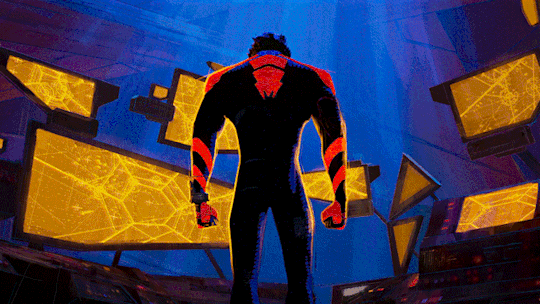
← chapter five // series masterlist
pairing: miguel o'hara x f!reader
rating: mature
word count: 4k
summary: misery makes good company
warnings: enemies to lovers, forced proximity, angst, i mean it guys, miguel o'hara is really not nice in this one, fighting, death/extinction, morally questionable characters, weapons of mass destruction, implied drug withdrawal, reader is given a backstory
notes: apologies for what's to come. it's okay if you hate me after

“Don’t move. You’ll make it worse.”
There’s a warm hand cupping the back of your head, callused fingers spread to steady the junction between it and your shoulder. It’s the first thing you notice when you wake; that, and the breath fanning across your face.
You think it odd. Signs of life pound beneath you like the febrile concoction of a dream, burning hot in emphasis that you’d survived. A heavy pulse behind your brow, the headache pinching at every sense until they all dim to conductive static. Your tongue, pasty on the roof of your mouth. The hind of your arm itches, the urge running bone-deep, humming from flesh gracelessly torn apart by a gutter. When you shift to examine it, a fire roars up your neck, the smouldering pain robbing you of any effort.
(The only other time you’d been this uncomfortable, you were bitten by a spider the third month of your internship with Alchemax. The puncture site didn’t burn so much as the delirium that followed.)
“What did I just say?”
And, there’s that voice. You find it difficult to discern its more unique attributes, words muffled from behind the wavering pane of your lucidity – yet, even still, it stands as the most tangible thing present. Deep, resonant. Smoked with a ruggedness you can feel in your teeth. It doesn’t occur to you why it seems so unfamiliar; perhaps it’s the fact that you catch it through its source, your ear pressed to a muscled chest. Or, that’s it’s whispering.
You’ve never heard him whisper. Not to you.
The need to retaliate swells once you realise who holds you. It’s nothing productive, not the string of questions you should be asking – what’s happening, where are we; but it’s the only natural instinct that overcomes you. When you attempt to make good on it, though, the clutter of jokes, gripes, and snubs tangle in your throat, emerging as little more than a groan.
And the act wears you more than it probably should, exhausted tremors wracking your frame. A tender ache ripples from a point on your ribcage – separate from the area you’d fractured at the quarry. The pressure here is more centralised, a focused bruise you locate the source of with a wriggle of your elbow, when a rock comes loose and clatters to settle underneath you. It joins a mound of similar rubble, a pseudo-cushion of chalky cement broken off the larger slabs surrounding you.
You assume they do, at least – based on what you can tell of the terrain behind your back. In reality, you have no means to confirm your circumstances. The space around you swims in ink-blot darkness, the type that is almost material, where sheer absence of light could be considered an element of its own. You squeeze your eyes shut, then widen them, and find that there’s no difference between the two.
So – dark, dusty and… cramped. You’re positioned across Miguel’s lap, his legs running under and perpendicular to yours. Neither of you can stretch them to their full extent, however, forced to cross and bend in unwieldy ways, tangling further in each other's limbs. Your clothes are worn out enough to allow you to detect when any surface of his body – tense abdomen and thick thighs – twitches, thrumming with a molasses-slow tension that starts to diffuse through you.
Not a scenario of his own choosing, then.
But the turn of events that might’ve converged to this are lost on you, white noise fluffing the space they’d evacuated. Last you recall, you were staring down a cop car, the lingering comfort of a child’s trust filling you with a remarkable sort of purpose, that which you cannot place. Had you acted against that convict? Or left it up to the man cradling you?
As if on cue, he speaks.
“You’re trapped under a collapsed building.”
He says you like he’s not a confounding variable in this equation. You know it’s meant to single your blame in this, stranding it somewhere where you can brood without cross-examining him or why he’s here too. It nests on a well of guilt you keep suppressed for good reason, irking you in a particularly special way.
“Figured that out for myself, thanks.” Despite the trouble you put into getting the retort out undisturbed, it ends up sounding more unconvincing than not. Miguel waits for the coughing fit you have afterwards to subside before pitching in his acknowledgment.
“Did you, now?”
Little shit isn’t even trying to hide his sarcasm.
You ignore him, continuing with your scepticism. “I’m just wondering why we’re still here.”
Because it’s a genuine conjecture. While you’re not a part of the educated camp in spider-hero abilities – being so clueless to the extent of your own – you’re far too familiar with that infamous super strength. You’d sensed the difference for yourself; your increasing aptness in carrying hefty weights, the fluidity with which you cruise through life, physically unperturbed. And you’ve been on the receiving end of the spectrum too, your skin littered with scars that point to the sheer power of your companion.
A few tonnes of demolished concrete should be a walk in the park for him.
He clicks his tongue like it’s obvious. “I pulled under a steel arc in time for the debris not to crush us. If I disturb this pocket, or try to rearrange a tunnel, then I run the risk again.”
The logic makes sense, as much as you hate to admit it. Of course, that doesn’t stop you from picking at the contrivances in his language. It was you when discussing what went wrong, and now it’s I when it comes to the out. You realise it’s probably unintentional. Somehow, that makes it worse. He must truly believe you’re nothing beyond a malevolent fuck-up; some villain willing to sacrifice herself for the greater demise.
(The latter might have its validity. It’s the former you hold issue with.)
Likewise, you also ascertain an easy fix to all this – on account of your spectral properties. And, if you were a better woman, it would’ve been feasible. Phase out, crawl through until you breach the open, get help.
It’s long since been established that you’re not that person, though – and you’ve come to accept your own incompetence. You don’t mean to die here; you’re not sure if you want him too either, for all your ire. But your immateriality is a fickle thing, recurring at the most inopportune times, in the smallest increments – a potential problem for the doubtlessly long crawl it’d take to escape. You don’t want to imagine what would happen should you solidify within the walls.
Resignation seems easier than tempting it.
Miguel must recognise the option as well. As it stands for him, he can’t afford to let you go, nor is he desperate enough to trust you yet despite it. You don’t bring it up then, maintaining the upper-hand by his misunderstanding of your capacity.
(Maybe you are evil.
Or, just tired.)
“That’s okay. I think it would be funny if we passed like this.” You pitch, nudging your cheek to urge the smile clearly lacking in your tone. There’s no humour behind your choice of phrase, and it’s a jarring step back from where he’d been, expounding himself. You suppose it might be a clumsy distraction from the exact gravity of your predicament, yet even that rolls over in your brain, not quite satisfactory to dissolve as truth. “It’ll make a nice story for the people who dig us up.”
His chest puffs, filling with an irritated inhale. In the same movement, his fingers constrict onto your cranial base; it has the adverse effect of bracing your neck for the sudden shift, minimising the soreness triggered by any activity. You decide to take it as the warning it’s meant to be instead.
“Eres patética.” He murmurs, sinking back down. You wince when his clutch weakens, pain flaring. “And whiplashed.”
You purse your lips, critical. “I’ve had worse.”
“Sure.”
“My arm–”
“Will be fine.” As if to punctuate, he reaches for the wound. A clink sounds when he taps it. “Used the nanotech off my suit as a bandage.”
You should have caught that it doesn’t sting like it would’ve if exposed. Similarly, his hands are gloveless. Bare – while the rest of him isn’t. You’d felt the dry surface of his palm, the fixed warmth it emanated, but for some oversight, you hadn’t considered that he was touching you. Skin-to-skin, the simple size of his fists dwarfing you in every measure.
A stone lodges in your throat.
“Did– How’d you know?” You pry, referencing the perpetual tenebrosity you’re suspended in.
What he replies with shouldn't shock you, not as much as it does. But the air’s shifted to a nuanced degree, a hesitation substituting loud anger. It's the awareness that he's just as tuned in to you as you are him, sympathetic to try and redirect you off the brink of death. Or, more likely, it’s the poignant impression of his fangs, wedged in your flesh, his tongue lapping up the very same path.
(And the wanton moan it’d triggered.)
“I could smell the blood.”
Oh.
Truthfully, you’ve no clue whether you respond aloud or keep your contemplation close to your psyche. He admits it almost… awkwardly, like it’s a condition he’s not so fond of himself. Yet it’s one that reverberates in the strained silence, plucking at taut strings that stretch with every passing second. You play it on repeat, stewing over the way in which he spoke; the diction, the stressors, the slight roll of his accent.
I could smell it. I could smell you. The blood.
Your life on the run hardly ever allows for moments like these. Over the past year, stress has anchored itself by the dock of your being, streamlining a flow of cortisol to every major organ. Continuity hinges on an alertness to the forces propelling you, and while the occasional wisecrack can alleviate some effects it has on your health, you don’t have the luxury of sinking into whatever fear bolsters it all.
It’s with him, though – hanging from a crane, or cornered in a pen of his own design. Only ever with him are you slapped with the resounding, festering distress of your own weakness. It consumes you, gnawing on your gut with its brutal teeth, tearing away the indifference you’d built around your systems. How dissimilar the two of you are; a girl unwilling to fight for even herself, and a man capable of wrapping a slash in the dark.
(He could smell it. And he can probably see, too.
By just how much does he outmatch you?)
“You’re welcome.” Miguel growls. You scold yourself for your elongated reticence, the pace of your heart overtaking the anxious torrent of thoughts that pump through you. It’s good practice to thank the man who’d saved your life four times over. Be that as it may, does it really count if he’s the reason it was necessary to begin with? He’d dropped you off that crane, he’d swung you a hundred feet high. Him, him, him.
You curl your tongue, desperate to quell the barrage of resentment that escalates at his prodding. Despite it pulling you from your rapid dissociation, your fight-or-flight peaks, forcing you to face a confrontation you don’t need. There’s nowhere to run – presently, you’re moored into place, his physicality and unique provocation blocking the possibility all together.
You scoff to placate the spiralling desire to argue.
It doesn’t work.
“For what?” You hiss.
All too quickly, his legs spread, creating a trough for you to slide down into. When your ass hits the unforgiving floor, you involuntarily cringe at the contrast it poses to his leg. A calculated effect, you’re sure – so too is the newfound freedom of his grip releasing your head, the crossing of his forearms pushing you away from the post his pecs provided.
It’s what you wanted, to distance yourself from his overbearing stature. And he manipulates it to his own favour; you’re made to bear your burden, the agony of your injured state tripling as if to exclaim: ‘see?’
Touché.
Nevertheless, it palliates your memory. The chill of the earth under you spikes your nerves, clearing the brume overcasting your day previous. You’d driven a car into that symbiote based on a groundless hypothesis; bold, any scientist would tell you. Yet, as far as your perception extends, it worked.
“Selfish.” He announces, far from discrete. It’s so unlike him that it smites the ego beginning to coagulate at your remembered success.
Your eyes snap to where you assume his face is, squinting like your glare makes any difference. “Excuse me?”
Undeterred by the threat inherent in your tone – that which is all talk – he persists. “Who do you think you are exactly, Wraith?”
The interrogation holds a dangerous quality; again, it feels out of place, a spirit tugging at the strings of his hollow self.
“Don’t call me that.”
“Why? What would you prefer? Anomaly, banshee? You drag death behind you like it’s a curse, only you’ve opted into it. I told you it wasn’t our place to interfere, and you had to push it–”
He can be jaded, or subtle. Oftentimes, he’s dismissive and passively rude.
But Miguel O’Hara is never heedlessly hostile. Not like this.
“That wasn’t my fault, asshole. I fucking glitched!”
“¡Órale, estás bien pendeja! Nothing ever is, of course! Has it never occurred to you to take a good look in the mirror?”
The irregularity scares you. Your voice breaks with it.
“O’Hara–”
“Because I’ll tell you what I see; a girl who can’t face what she’s done.”
“You don’t know me.” You shake your head, tamping the stiffness in your shoulder. It does nothing to exercise the sharp unease that flays you alive.
“A self-serving criminal who refuses to listen.”
“I d– I tried.” Hiccupping, the edge worsens.
“You’d have gone back home–”
“There’s nothing left for me there!”
“Like there is anywhere else? You’ve devastated them!”
“Stop it–”
“Wrecked entire worlds! I’ve been the only one holding it all together,” He yells, pushing his knees closer to one another. You’re slowly crushed in the process, thighs drawing up to press against your torso. “You’re no victim. You’re no hero.”
“Stop it!”
“Tell me I’m wrong!”
Feverish tears slice down your cheeks, spouting to escape the pressure that balloons within you. Your lungs tighten alongside it, heart aching. It’s progressed past the point of prevention – no longer do you retain control of how this turns out. All you can do is drift; a feather, seized in this tempest, stirred by a disembodied man.
When you don’t respond, preferring to preserve your energy for the sobs that rip from you, he inches closer. You sense it when he repeats himself, his hot breath lining the shell of your ear.
“Well,” His claws sharpen, grazing the small of your back. “Am I?”
His lisp is more pronounced like this, fangs extended to affect the natural position of his mouth. It warps the undertone, like a pool does light, and sends it back more viscous than ever. He’s uninhibited – an addict missing his fix.
It’s almost impossible to choke the admission out against the hatred churning your stomach. When you unhinge your jaw, it’s a credible wager that you retch all over yourself instead.
“No.” You manage to warble, a mixture of snot and wet misery streaking down your chin. Your wrists stay plastered, allowing the mess to mask your countenance, tucking between your legs in a childlike attempt at comfort. Cruelty crackles – self-propagated now – assaulting your faux-confidence until it plummets to a fraction of what it was.
Cursed. A wraith – haunting the multiverse with her unfinished business.
There’s nothing left to declare as his impressions are confirmed. You both mark it, this changed, spoken into existence by your divulgence. By some miracle, if you were to slip his capture, it’d be no more of a victory than the gore crusting your fingernails. Proof for his belittlement; that you truly are so inconsiderate as to further endanger the lives of millions.
(Would you be able to live with yourself?)
You relapse, agonising over the past week. Not a victim – you’d taken advantage of him with a kiss for an unsure opportunity. Not a hero – you’d punched a robber and gotten a civilian killed in the process. You’d run over a murderer and buried several under an early grave.
(Can you live with yourself?)
And home–
Trapped, you boil in a pond of your transgressions. It’d been a long time coming – your fault, in fact. You should’ve noticed the water was gradually heating.
There’d been a dam of careful construction at this bank, stacked tirelessly over the several nights you’d been given to think on what you’ve done. To prevent your clear culpability from catching up to you, to blind others to it too. He’s right, but not about all things. You’ve memorised your reflection at this point. Put it in a line up, and you’ll point your place in hell with facile certainty.
So, there’s no need to admit anything else. Regardless, his sabotage compels you to. Here, loitering purgatory with the one person who’d never understand; what harm could confession do? His opinion of you skims rock bottom, and you’ve no hope at seeing a priest before you rot.
Forgive me, for I have sinned.
“I’m not innocent.” You start. “Never have been.”

Alpha Centauri, that was the goal.
Located only four light years away, it’s the closest star system to Earth; with suns Rigil Kentaurus, Toliman and Proxima Centauri forming a trinary network. All main sequence stars – like humanity’s very own Sol – orbited by suspected habitable exoplanets. With the average chemical rocket, it’d take upwards of six thousand years to get there.
There lay alternatives, of course. Nuclear fission, with an energy yield of almost zero from its original mass. Fusion, ten times as efficient – still, not nearly enough. Ion accelerators, sunlight capture. Interstellar arks were of no interest; no, you’d wanted to achieve extrasolar travel within your lifetime. Warp drives and hyperspace – all theoretical.
As an undergrad, you’d settled on matter-antimatter collision.
The latter, antimatter, exists as an inverted twin to ordinary subatomic particles, with flipped states on every front. Antiprotons – negative protons with oppositely directed magnetism, and positrons – positively charged electrons. When the two meet their counterparts, their entire mass is converted into energy. And, when such annihilation is modelled within engines, a ship can accelerate to ninety percent the speed of light.
Therein subsisted your only chance to touch the stars.
Of course, like all hypotheticals, it came with its own array of issues. No natural reservoir of the substance is known, and producing at least one tonne would take more power than mankind has used in all its history. Moreover, it’s near nonviable to store. Any container that has ever touched regular matter would only cause preemptive decimation.
You wrote papers and studied computer-generated prototypes. You argued with professors, and attended pro-conferences. Months worth of minimum wage were blown on trips to Argentina, where the neighbouring system can be spotted through a telescope, winking above the horizon. When it all started to appear fruitless, you caught wind of Alchemex’s exploits within the field.
It was a young company, hobbling on its feet after a rocky merger with Oscorp. But they were daring, and rich, endeavouring into categories that most deemed nonprofit. You’d applied for an internship, waited months to hear back. By some cosmic karma, it turned out to be good news when you eventually did.
They were already working on manufacturing the antimatter. It was your suggestion that encouraged them to use magnets to store it within a vacuum.
It looked auspicious. It had been.
Then, you were bit.
The spider was from another division – radiation, you suppose. By some breach on account of a more negligent temp, the critter had found its way into your improvised cubicle. And so the story goes; it’d champed down on the webbing between your thumb and forefinger, before promptly suffocating under the cup you’d snared it in. The area stung for a while, venom having directly found your veins. Yet, by the time you’d returned to your dorm, your immunity seemed to have diluted its effects.
Until, you’d gotten sick. The hysteria was slow to consolidate, starting as a sore throat. You’d used your one day off then, ignorant to just how bad it could get; because the fever only deepened, lesions on the lining of your oesophagus oozing ichor into bile. Your doctor waived the possibility of tuberculosis, mistrusting the notes your instructors sent with you, complaining of in-class fainting bouts.
You couldn’t miss work, though. Never. Not when you were so close.
So you stuffed sheets of pills in your pockets and braved each shift with trembling joints. You’d no friends to notice your suffering, and for such an ambitious company, overtime was expected. Sweating through multiple layers of clothing, you kept an eye on your poster of the galaxy and lagged on those long nights. At the rate you were going, you genuinely dreaded a life cut short before you could realise your objective.
If nothing else, it urged you to work harder.
Your first milestone came at the one kilogram mark. A party was hosted to celebrate, billionaires invited to gather around the vessel which held such a revolutionary feat. Despite your interloper status, you’d been summoned too, to play big girl scientist and present Alchemex’s future course of action. Your affliction was improving, and you were the inspiration behind the project’s advance. It felt like the biggest night of your career.
(‘Magnets! What a genius solution.’ From a nobel prize runner up.
‘That ambition will get you far, mark my words.’ The CEO’s cousin.)
In truth, it was the last.
Because the antimatter had taken centre stage, security slackening with its continued stability. So long as the magnetism wasn’t tampered with, so long as the vacuumed vessel remained airtight, things looked to be fine for your speech. You’d cycled through every known variable, staring down the container, a champagne flute tucked in your sweaty palms.
Your skin prickled.
The glass smashed to the floor. In your embarrassment, you’d brushed it off as clumsiness prompted by the perspiration – notwithstanding your recount, having seen the drink fall through your mass. Did it matter, though? You couldn’t put it past your illness to cause such hallucinations. It was impossible, a trick of sight.
The festivities progressed, yet the tingle of your nerves didn’t subside. Anxiety – you chalked it up to common apprehension. So, when your boss announced your name for all to hear, and the agitation flared, it wasn’t alarming. You could think of nothing else anyway, honed in to the address you’d practised all morning.
Good evening, ladies and gentlemen.
Your gut flipped. Your vision blackened.
The steps lost depth; you stumbled up them with all the grace of a hunted fawn.
Today–
Your skin prickled once more, and you collapsed. Through the antimatter’s vessel, through the floor.
There’s nothing to recall after that. Not for a long while.

“I don’t become intangible.” Your brow bone rests on the curve of your knee, body curled in a foetal position. “My particles merely… find the best way through something.”
Miguel has remained eerily quiet throughout your chronicle. You try not to let it dissuade you.
“So–”
“Some came in contact with the antimatter.”
“Yeah.” You murmur, moved by an unnamed emotion. “It detonated, naturally, with a force roughly equivalent to a nuclear bomb. Wiped out everyone in the city upon discharge, then everyone in the state with its impact. Or– maybe, I don’t know. I was discarnate for weeks – the explosion had no effect on my immaterial self, and the radiation couldn’t hurt me when that spider damn well sought and failed at it already.”
You hug yourself tighter.
“I only witnessed the winter that followed. The blast was large-scale enough to trigger firestorms and a global climate cooling – similar to the one they scare you with when talking about nuclear warfare. Crop failure, famine. Millions died and my home devolved into cataclysm. It was mass extinction,” You school yourself, waving the snivel crawling up your nose. “Because of me.”
An end by starvation or infection, confined to this tomb, seems a perfectly fitting penance.
“Explain this to me, O’Hara – what just providence made me spider-woman to a barren land?”

chapter seven →
follow @moondirti-archive and turn on post notifs to be alerted of future updates!
#miguel o'hara#miguel o'hara x reader#miguel o'hara fanfiction#miguel ohara#spiderman: across the spiderverse#across the spiderverse#spiderverse#spiderman 2099#miguel ohara x reader#spiderman 2099 x reader#miguel o'hara x you#miguel o'hara x y/n#miguel o'hara x f!reader#miguel o'hara fanfic#miguel ohara x you#miguel ohara x y/n#miguel ohara x f!reader#miguel ohara fanfic#spiderman 2099 x y/n#spiderman 2099 x you#x reader#x you#x y/n#x f! reader#marvel#atsv#fanfic#fanfiction#spider man: across the spider verse#spiderman: atsv
1K notes
·
View notes
Text
Halloween prompts year 2, day 1
Danny had no idea what he was doing. There. He admitted it. He had found a book of spells that reminded him of Sam and stole it on instinct. He didn't have much money after running away. He didn't even have the chance to grab one of his Go Bags as his parents fired on him.
Good news was that ghost powers made it very easy to steal stuff. Now with a book that has actual magic spells in it? He'd never go hungry again! It was kinda weird though. New dimension or not he didn't think a grocery store would sell multiple copies of spellbooks just out in the open like this. They were clearly new and a product or modern manufacturing so it wasn't like it was some ancient relic or anything.
Hmm. A mystery for later then. In the meantime he was going to go around Gotham turning rogues and random jerks into frogs! It went pretty well. There was a mass Arkham breakout not too long ago and Danny was having an absolute blast sneaking up and froggifying people while wearing a cheap glittery devil masquerade mask. Once suitable frogged he trapped them in a magic bubble and left them on the rooftops for the bats to find.
This went awry however when one of the local vigilantes, Robin, tried to attack him from above. On reflex he turned Robin into a frog and freaked out, "Okay. Crud. Okay. I can fix this!" He said while picking up the tiny vigilante, "Just promise not to hurt me and i'll turn you back!"
The angry ribbiting told him that the vigilante would agree to no such thing, "In that case," Danny used his ghost powers to make a human sized ice cage and placed the frog inside. The cages bars were thin but sturdy. It would take Robin only a few good hits to break out of it but by that time the mysterious magic user would have had a head start.
Unfortunately, Danny had just started the spell that would turn Damian back when one of his siblings, Tim, got the jump on him...and got similarly froggy for it. Now there were two frogged bats and a startled magic user.
Danny looked up at the rooftops to see more and more bats staring at him. And the just froggified Red Robin. And the frog version of regular Robin. In a cage. This looked bad. After dodging a batarang Danny apologized to the frogs and quickly yelled, "Not today satan!" At batman before dropping a smoke bomb and teleporting away.
Later at the batcave Damian and Tim were placed in different enclosures to keep their new forms healthy and to prevent any frog on frog violence as they sort this out. At first they thought this was a meta who could turn people into frogs but that was quickly ruled out due to Damian and Tim both typing on devices and telling them about the ice powers.
Thus begins Danny's attempts to find the frogged siblings and turn them back before he gets stabbed by an angry bird and Robin and Red Robins attempts to escape to find this magic user cause it was clear that he had cursed them by accident and had wanted to turn them back right away.
They're family keeps trying to stop them though saying its too dangerous to go out as a frog and they don't know what that magic users intentions were. They didn't really have much choice however seeing at Constantine couldn't help them.
The trench coated brit and said this magic was like nothing he had ever felt before and he would have to do some research. Which lead to the boys swinging across rooftops as amphibians and probably making more than a few people question what was in thier coffee.
#halloween prompts#prompts#fanfiction prompts#dp x dc#danny fenton#danny phantom#tim drake#robin#damian wayne#red robin#yum#magic#danny is going to get caught up in a custody battle isnt he?#adoption bait danny
856 notes
·
View notes
Text
This is it. Generative AI, as a commercial tech phenomenon, has reached its apex. The hype is evaporating. The tech is too unreliable, too often. The vibes are terrible. The air is escaping from the bubble. To me, the question is more about whether the air will rush out all at once, sending the tech sector careening downward like a balloon that someone blew up, failed to tie off properly, and let go—or more slowly, shrinking down to size in gradual sputters, while emitting embarrassing fart sounds, like a balloon being deliberately pinched around the opening by a smirking teenager.
But come on. The jig is up. The technology that was at this time last year being somberly touted as so powerful that it posed an existential threat to humanity is now worrying investors because it is apparently incapable of generating passable marketing emails reliably enough. We’ve had at least a year of companies shelling out for business-grade generative AI, and the results—painted as shinily as possible from a banking and investment sector that would love nothing more than a new technology that can automate office work and creative labor—are one big “meh.”
As a Bloomberg story put it last week, “Big Tech Fails to Convince Wall Street That AI Is Paying Off.” From the piece:
Amazon.com Inc., Microsoft Corp. and Alphabet Inc. had one job heading into this earnings season: show that the billions of dollars they’ve each sunk into the infrastructure propelling the artificial intelligence boom is translating into real sales.
In the eyes of Wall Street, they disappointed. Shares in Google owner Alphabet have fallen 7.4% since it reported last week. Microsoft’s stock price has declined in the three days since the company’s own results. Shares of Amazon — the latest to drop its earnings on Thursday — plunged by the most since October 2022 on Friday.
Silicon Valley hailed 2024 as the year that companies would begin to deploy generative AI, the type of technology that can create text, images and videos from simple prompts. This mass adoption is meant to finally bring about meaningful profits from the likes of Google’s Gemini and Microsoft’s Copilot. The fact that those returns have yet to meaningfully materialize is stoking broader concerns about how worthwhile AI will really prove to be.
Meanwhile, Nvidia, the AI chipmaker that soared to an absurd $3 trillion valuation, is losing that value with every passing day—26% over the last month or so, and some analysts believe that’s just the beginning. These declines are the result of less-than-stellar early results from corporations who’ve embraced enterprise-tier generative AI, the distinct lack of killer commercial products 18 months into the AI boom, and scathing financial analyses from Goldman Sachs, Sequoia Capital, and Elliot Management, each of whom concluded that there was “too much spend, too little benefit” from generative AI, in the words of Goldman, and that it was “overhyped” and a “bubble” per Elliot.
As CNN put it in its report on growing fears of an AI bubble,
Some investors had even anticipated that this would be the quarter that tech giants would start to signal that they were backing off their AI infrastructure investments since “AI is not delivering the returns that they were expecting,” D.A. Davidson analyst Gil Luria told CNN.
The opposite happened — Google, Microsoft and Meta all signaled that they plan to spend even more as they lay the groundwork for what they hope is an AI future.
This can, perhaps, explain some of the investor revolt. The tech giants have responded to mounting concerns by doubling, even tripling down, and planning on spending tens of billions of dollars on researching, developing, and deploying generative AI for the foreseeable future. All this as high profile clients are canceling their contracts. As surveys show that overwhelming majorities of workers say generative AI makes them less productive. As MIT economist and automation scholar Daron Acemoglu warns, “Don’t believe the AI hype.”
6 August 2024
#ai#artificial intelligence#generative ai#silicon valley#Enterprise AI#OpenAI#ChatGPT#like to charge reblog to cast
183 notes
·
View notes
Text
Man, there is a huge bias in the way that hobby fibercrafters approach and think about textiles—and I say that as a hobby fibercrafter myself! See, weaving has a high barrier to entry relative to knitting, crochet, spinning—even embroidery or sewing, these days, as the sewing machine automated much of the tedium of the craft. All of those crafts require a lot less in terms of startup costs to the hobby crafter than the machinery of a loom does.
But... look, if you want to understand mass produced textiles or textiles in any historical context, you have to understand weaving. If you want to understand how most of the cloth that people wear is made, you have to understand weaving, because weaving is the oldest art for mass producing cloth that can then be turned into garments.
Spinning is also very important, of course. Spinning is how you get the thread that you can turn into cloth any number of ways. Historically speaking, though, the most common way that thread or yarn becomes cloth is inarguably weaving. More to the point, weaving is also a historical center of industry and labor organizing. Ironically enough for the argument about how no one asked a woman, the industrialization of weaving is actually an interesting early case example of men organizing to push women out of a newly profitable position.
Besides that, knitting and crocheting in particular are incredibly modern crafts. Most modern knitting as we would understand the craft is shaped by the inventions of Elizabeth Zimmerman, and even things like the circular knitting needle date back only to the past century. Historically speaking, the great innovation of knitting as a tool for fiber craft is the ability to construct garments for small, odd shapes that can stretch and grip: stockings, gloves, underwear. Even that great innovation, the knit sweater, is an artifact of the 1850s—and the familiar cable knit sweaters of the Aran Isles are even newer than that. Crochet is even younger: the entire craft originated in the 1820s as far as anyone can document.
None of that is any shade on anyone. Like I said, I knit; that's the locus of my personal interest in textiles. I just think that textile history is neat, but if you're going to make big pronouncements about the historical development of textiles, it's important to think about what changed about the technology of textile production in the most common ways of turning raw fiber into cloth—and you cannot stop at the level of understanding how to make thread or yarn, because the properties of the cloth are always going to be an artifact of the construction of the cloth.
That's technology, baby! It's literally weavecraft. But it's not obvious that weaving is missing from the bounds of a person's experience with textile manipulation until and unless they're trying to understand and work with a wide range of fabric types—and when you can quite reasonably go from raw fiber to a finished garment using modern popular craft techniques that don't rely on anything that appears difficult for a medieval craftsman to make, it's easy to forget the role of weaving in the creation of cloth as a finished product.
I suppose the point I am making is: think deeply about what your own areas of expertise are not bringing to your understanding of history. It's easier to miss things you'd think.
279 notes
·
View notes
Text
one thing I think a lot of people don’t understand about the crowdstrike outage is that this wasn’t a freak accident. the only thing notable about it was a scale, and this is just the beginning
like sure, many businesses do things to mitigate the risk of this type of thing like production controls, release schedules, QA, staggered rollouts, etc. but these mitigations just lessen the impact of these thing when they happen. and they do happen. constantly.
CEOs and the board members behind them demand new, complex, revenue generating, features from overworked and underpaid developers (often in exploited nations) who build whatever they can by the deadline and push it to QA.
QA has been cut and what hasn’t been cut has also been outsourced and when testing code that is rushed, there are bound to be a lot of issues. when you don’t have the manpower to test each change exhaustively or the man power to fix seemingly ‘non-impactful’ bugs identified by the QA engineers before pushing to prod, they pile up over time. everything seems to work fine on the surface, but the issues are still happening.
following the trend of lean staffing, production support is absolutely bare bones. the $1M salary tech bros are not developers anymore— they’re security specialists or product managers. the people who actually identify and fix problems make a fraction of the salary and do the work of 6 people and are highly discouraged from fixing or improving anything that doesn’t have an immediate impact on the user base or that doesn’t lead to increased revenue generation.
and not enough people to develop, not enough people to test, not enough people to fix, leads to a janky code base that only survives on luck and goodwill. as the tech bubble continues to burst— with venture capital drying up for tech companies who were never going to be profitable— the people doing this work are only going to get more overburdened.
the small things add up and you never know when an update is going to cause the whole thing to come crumbling down because 6 bugs that were identified and backlogged as ‘low impact’ happened to work together to take your server offline when an update to patch a security vulnerability gets pushed out.
anyone who’s working in tech is familiar with the way these companies are managed. not to position myself as an industry expert, but after working at tech startups in the SaaS space for the last 7 years, I’ve watched this happen (and personally cleaned up) at least 4 times.
I expect that we will continue to see different outages with widespread social and economic impact that will eventually lead the tech bubble to collapse entirely as investors flee en masse to escape the “increased risk of tech industry start ups”.
#when I was in support we had a 3 day outage that affected every single customer#there have been at least 3 other occasions with a similar impact.#and these are companies with 1k or less clients. imagine how much higher the stakes are at companies with hundreds of millions of active#users#tech#crowdstrike
155 notes
·
View notes
Text
White journalism has mostly been utterly rubbish at covering the recent controversy between Jasmine Crockett and Marjorie Taylor Greene, writing about the incident as two women who derailed a meeting when they hurled appearance-based insults at each other, not understanding that what Greene, a literal white supremacist, was doing by commenting on Crockett's fake eyelashes affecting her work, was actually implying that Crockett's appearance was unprofessional and therefore, incompetent. The appearances of Black and Brown women are often scrutinised and they are penalized for not adhering to standards rooted in white supremacy.
Here's a written account by a Black woman:
I looked up to find a critical mass of Black women excitedly converging upon my interview station. Forming a half circle around my table, they began exclaiming how enamored they were by my appearance and how it countered much of the counseling they had received on how to appear “professional” and “look like a lawyer.” They emphatically discussed the damage and financial expense they incurred to straighten and subdue their naturally coiled, gravity defying hair to appear “polished” and “professional” for their interviews. They shared how they spent several hours in several stores seeking a skirt suit that would complement their figure, but not emphasize or unveil their curves, and were ultimately forced to splurge on a tailor to appear feminine and physically appealing without being hypersexualized, since the average suit is not designed to fit their body type. They were told to wear these skirt suits with “flesh toned” stockings and “nude” makeup for a “polished” but “professional” look, and reflected upon their frustration running up and down retail aisles seeking “flesh tones” and “nude” colors that actually matched their complexion, since the “darkest” shade of most products still only reflect the darkest tone of white or light skin. They looked at me, a visibly Black woman with brown skin, wearing bold gold earrings, a large naturally curly afro, bright colored fitted pant suit, and bare-face except for a bright red lip, and questioned whether it might be possible to enter the legal profession without having to leave elements of their Black womanhood behind.
152 notes
·
View notes
Text
Some Tips & Advice for Writing Fiction
"Since advice is usually ignored and rules are routinely broken, I refer to these little pearls as merely 'suggestions.'....There’s nothing binding here. All suggestions can be ignored when necessary." —John Grisham
Love your story. Many writers create their best work when they’re deeply invested in their characters and plot.
Withhold information from your readers. When writing fiction, only give readers the information they need to know in the moment. Ernest Hemingway’s iceberg theory in writing is to show your readers just the tip of the iceberg. The supporting details—like backstory—should remain unseen, just like the mass of an iceberg under the water’s surface. This prevents readers from getting overwhelmed with information and lets them use their imagination to fill in the blanks.
Write simple sentences. Think of Shakespeare’s line, “To be or not to be?” famous for its brevity and the way it quickly describes a character’s toiling over their own life. There is a time and place for bigger words and denser text, but you can get story points across in simple sentences and language. Try using succinct language when writing, so that every word and sentence has a clear purpose.
Mix up your writing. To become a better writer, try different types of writing. If you’re a novelist, take a stab at a short story. If you’re writing fiction, try writing nonfiction. Try a more casual writing style by blogging. Each piece of writing has a different point of view and different style rules that will help your overall writing skills.
Write every day. Great writers have a regular writing habit. That means dedicating time every day to the craft of writing. Some writers assign themselves a daily word count; Stephen King writes 2,000 words a day. You might also join a writing group; being accountable to other people is a great motivator. Don’t worry if what you jot down is technically bad writing or you struggle to get something onto a blank page. Some days will be more productive than others. The more you write the easier it gets.
Set milestones. The average word count for a book is 75,000 words. That can make novel writing intimidating. If you’re working on your first novel, stay motivated by setting milestones. This will help you break the book down mentally so it is easier to manage and easier to stick with.
Understand basic story structure. Professional writers are well-versed in the framework most stories follow, from exposition and rising action through to the climax and falling action. Create an outline to map your main plot and subplots on paper before you get started.
Don't write the first scene until you know the last. This necessitates the use of a dreaded device commonly called an outline. Virtually all writers hate that word. Plotting takes careful planning. Writers waste years pursuing stories that eventually don’t work.
Learn strong character development techniques. There are effective ways to create a character arc in literature. Learn what character information to reveal to increase tension in your story. Your main characters should have a backstory that informs their actions, motivations, and goals. Determine what point of view (POV)—first person or third person—complements the character’s interpretation of events.
Use the active voice. Your goal as an author is to write a page-turner—a book that keeps readers engaged from start to finish. Use the active voice in your stories. Sentences should generally follow the basic structure of noun-verb-object. While passive voice isn’t always a bad thing, limit it in your fiction writing.
Take breaks when you need them. Writer's block gets the best of every writer. Step away from your desk and get some exercise. Getting your blood flowing and being in a different environment can ignite ideas. Continue writing later that day or even the next.
Kill your darlings. An important piece of advice for writers is to know when words, paragraphs, chapters, or even characters, are unnecessary to the story. Being a good writer means having the ability to edit out excess information. If the material you cut is still a great piece of writing, see if you can build a short story around it.
Don't introduce 20 characters in the first chapter. A rookie mistake. Your readers are eager to get started. Don’t bombard them with a barrage of names from four generations of the same family. Five names are enough to get started.
Read other writers. Reading great writing can help you find your own voice and hone your writing skills. Read a variety of genres. It also helps to read the same genre as your novel. If you’re writing a thriller, then read other thrillers that show how to build tension, create plot points, and how to do the big reveal at the climax of the story.
Read beyond what you like. Dutch writer Thomas Heerma van Voss says: "Read as much and as widely as possible. See how other writers construct their scenes, tease the reader, build tension. Don’t be afraid, especially when starting out, to steal or imitate – all arts begins with imitation. One of the Netherlands’ most famous writers began his writing career by copying out stories by Ivan Turgenev in an effort to master his rhythm and way of writing."
Read writers who do not write like you. Trinidadian-British poet Vahni Capildeo says: “Make friends with writers who do not write like you. Swap books. Show each other work. Take the long view and the wide view. Writing adds your lifetime to the lifetime of everyone else who has written or read, or who will read or write, including non-‘literary’ folk. All sorts of people work carefully or lovingly or effectively with words. You may find inspiration in a law report (ancient or contemporary) or a tide chart, or in an ‘unplayable’ play…"
Research. Critically acclaimed novelist Guinevere Glasfurd says: “Writers are often exhorted to ‘write what they know’. But what if your protagonist is a fourteenth-century nun? Or a drag queen from Kentucky (and supposing you, the writer, are not)? Start by reminding yourself why you want to tell the story. Research can be frustrating; sometimes the archive is silent, the answers are not there. There’s a reason for that and that should spark other questions. Research can also be enormously rewarding. It can, and likely will, reveal something unexpected. It is important to remain alert to that, to be attentive and open to surprise. Research is an iterative process. Research a bit, write a bit, research a bit more. Allow your writing to remain fluid at this point, open to question, encouraging of further enquiry.”
Write to sell. To make a living doing what they love, fiction writers need to think like editors and publishers. In other words, approach your story with a marketing sensibility as well as a creative one to sell your book.
Write now, edit later. Young writers and aspiring writers might be tempted to spend a lot of time editing and rewriting as they type. Resist that temptation. Practice freewriting—a creative writing technique that encourages writers to let their ideas flow uninterrupted. Set a specific time to edit.
Get feedback. It can be hard to critique your own writing. When you have finished a piece of writing or a first draft, give it to someone to read. Ask for honest and specific feedback. This is a good way to learn what works and what doesn’t.
Think about publishing. Few authors write just for themselves. Envision where you want your story to be published. If you have a short story, think about submitting it to literary magazines. If you have a novel, you can send it to literary agents and publishing houses. You might also consider self-publishing if you really want to see your book in print.
Ignore writing advice that doesn't resonate with you. Not every writer works the same. You have to figure out what works for you in the long run. If working off of bullet-point outlines gives you hives, then don't do it. If you work best writing scenes out of order, then write those scenes out of order.
Sources: 1 2 3 4
#writing tips#writing advice#writeblr#studyblr#booklr#fiction#writers on tumblr#spilled ink#dark academia#light academia#literature#creative writing#writing prompt#on writing#writing reference#writing resources#poets on tumblr
112 notes
·
View notes